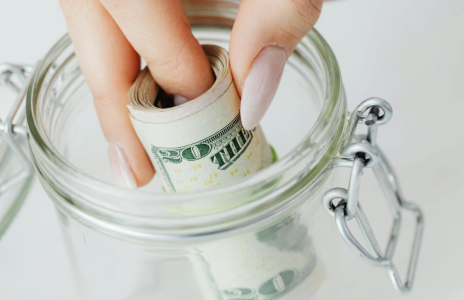30 surprising money tricks people swear by—some might actually work
By
Veronica E.
- Replies 0
Let’s be honest: saving money isn’t always easy.
Between everyday expenses, rising prices, and the occasional impulse purchase, it can feel like your paycheck disappears faster than you can say “budget.”
But online, people are sharing a mix of creative—and sometimes downright strange—ways to make every dollar go further.
Some are practical, others hilarious, and a few might just surprise you by how effective they are.
Whether you’re saving for travel, building an emergency fund, or just trying to stretch your Social Security check a little further, these unconventional money tricks show that saving doesn’t always have to be serious—it can even be fun.

Think before you buy
1. The hourly wage test
Before you purchase something, ask yourself: Would I work X hours for this? If not, put it back.
Suddenly, that $40 candle or $75 sweater may not seem worth half a day’s work!
2. The 24-hour rule
For any non-essential item, wait a full day before buying.
Chances are you’ll forget about it—and your wallet will thank you.
3. The five-day wait
If you’re still thinking about that purchase after five days, go for it.
If not, you just saved money without any regret.
4. The “will this improve my life?” test
Ask yourself if this purchase will truly make your daily life better.
If the answer’s no, keep your money where it belongs—in your savings!
Also read: Dental care can be costly, but these 5 tricks could save you money
Make saving harder (on purpose)
5. The “hard-to-access” account
Open a savings account that takes a few days to withdraw from.
That extra step can stop impulse transfers before they happen.
6. The no-withdraw rule
Some savers open accounts that allow deposits only.
If you dread going into the bank, that inconvenience might just be your best saving strategy!
7. The CD commitment
Put your savings into a Certificate of Deposit (CD).
The penalty for early withdrawal helps you resist temptation—and builds interest while you wait.
8. The unbreakable piggy bank
Buy a sealed piggy bank you can’t open without breaking.
You’ll only “cash out” when it’s really worth it.
Also read: Uber’s new ride option could change your commute—and save you money
Trick your brain into saving
9. The fake paycheck trick
Tell yourself you make less than you do.
If your paycheck is $400, pretend it’s $300. You’ll spend less automatically.
10. The imaginary habit fund
If you don’t smoke, set aside the money you would have spent on cigarettes.
It adds up shockingly fast!
11. The “I’m broke” mindset
Convince yourself you’re broke until your next payday.
It’s mental budgeting—but it works.
12. The “forgotten drawer” stash
Hide small bills in an old drawer or envelope.
Forget about them until you really need them—you’ll thank your past self later.

Also read: One ChatGPT thrift shopping secret could save retirees over $100 a month
Change your habits, not your income
13. The coffee shop switch
Make coffee at home and “tip” yourself what you would’ve spent. One cup at a time, those savings grow.
14. The spicy food trick
Some swear by eating spicier meals—it curbs your appetite and helps groceries stretch a bit longer.
15. The sleep-more strategy
More rest means fewer late-night snacks and shopping sprees. (And it’s better for your health, too.)
16. The environmental pause
Before buying, ask: How long will this sit in a landfill?
It’s a simple way to slow spending and make more mindful choices.

Also read: Heatwave alert: 6 smart AC tips for you to stay comfortable and save money
Cut digital temptations
17. The app purge
Delete shopping apps or disable notifications.
Out of sight, out of mind—and out of your wallet.
18. The in-person rule
Pretend online shopping doesn’t exist.
If you really want something, you’ll need to visit the store.
19. The expense diary
Track every purchase.
When you see where your money goes, you’ll naturally start trimming unnecessary spending.
20. The round-up app
Apps like Acorns or Qapital automatically round up your purchases and invest the spare change.
You’ll save without even noticing!

Also read: Stop wasting money: The top items you’re overspending on revealed!
Turn saving into a game
21. The “pick up, put down” trick
See something tempting? Pick it up, admire it, and put it back.
You get the satisfaction of shopping—without the bill.
22. The “dude jar”
Every time you say a certain word—like “dude,” “okay,” or “wow”—add a dollar to your savings.
It’s silly, but surprisingly effective!
23. The “comparison-free” challenge
Stop trying to keep up with others. Your financial goals are your own—let them guide your spending choices.
24. The “cash-only” challenge
Pay with cash for one week.
Watching real money leave your hand makes spending more tangible—and easier to control.
25. The “cash payback” trick
When friends owe you money, ask for cash instead of digital transfers. You’ll be less likely to spend it impulsively.

Also read: Slash your grocery bill with this simple trick—learn how and save money!
Plan and protect your progress
26. The subscription checkup
Once a month, review your subscriptions—streaming, apps, magazines.
Cancel what you don’t use and free up some extra cash.
27. The fake emergency fund
Imagine you’re saving for a car repair or surprise bill.
When the real emergencies come, you’ll already be prepared.
28. The “wait and see” fund
Before making a large purchase, park that money in savings for a few weeks.
If the urge fades, you’ve just paid yourself instead.
29. Dumpster diving (within reason)
Believe it or not, some shoppers find like-new items discarded by stores.
If you’re tempted to try, check local laws first—and bring gloves!
30. The “bank avoidance” bonus
If you dislike bank visits, use that to your advantage: open an account you never check.
The harder it is to access, the more you’ll save!
Also read: Make your retirement money last—15 genius, practical ways to cut costs and enjoy life more
Expert insight: consistency beats creativity
While some of these tricks are unconventional (and a few admittedly wacky), the foundation of smart saving remains the same.
Financial planner Khushboo Dugar advises: start with a clear budget, set achievable savings goals, and track your spending consistently.
Awareness, discipline, and small daily choices are what truly build long-term financial health.
Read next:

Have you ever tried one of these unconventional ideas—or invented your own? Did it actually help you save, or end in a funny fail? Share your best money-saving tricks and stories in the comments below to help others make saving a little more creative (and a lot more fun)!
Between everyday expenses, rising prices, and the occasional impulse purchase, it can feel like your paycheck disappears faster than you can say “budget.”
But online, people are sharing a mix of creative—and sometimes downright strange—ways to make every dollar go further.
Some are practical, others hilarious, and a few might just surprise you by how effective they are.
Whether you’re saving for travel, building an emergency fund, or just trying to stretch your Social Security check a little further, these unconventional money tricks show that saving doesn’t always have to be serious—it can even be fun.

From quirky savings jars to clever budgeting habits, these creative money tricks prove there’s more than one way to grow your savings. Image source: Pexels / Photo By: Kaboompics.com.
Think before you buy
1. The hourly wage test
Before you purchase something, ask yourself: Would I work X hours for this? If not, put it back.
Suddenly, that $40 candle or $75 sweater may not seem worth half a day’s work!
2. The 24-hour rule
For any non-essential item, wait a full day before buying.
Chances are you’ll forget about it—and your wallet will thank you.
3. The five-day wait
If you’re still thinking about that purchase after five days, go for it.
If not, you just saved money without any regret.
4. The “will this improve my life?” test
Ask yourself if this purchase will truly make your daily life better.
If the answer’s no, keep your money where it belongs—in your savings!
Also read: Dental care can be costly, but these 5 tricks could save you money
Make saving harder (on purpose)
5. The “hard-to-access” account
Open a savings account that takes a few days to withdraw from.
That extra step can stop impulse transfers before they happen.
6. The no-withdraw rule
Some savers open accounts that allow deposits only.
If you dread going into the bank, that inconvenience might just be your best saving strategy!
7. The CD commitment
Put your savings into a Certificate of Deposit (CD).
The penalty for early withdrawal helps you resist temptation—and builds interest while you wait.
8. The unbreakable piggy bank
Buy a sealed piggy bank you can’t open without breaking.
You’ll only “cash out” when it’s really worth it.
Also read: Uber’s new ride option could change your commute—and save you money
Trick your brain into saving
9. The fake paycheck trick
Tell yourself you make less than you do.
If your paycheck is $400, pretend it’s $300. You’ll spend less automatically.
10. The imaginary habit fund
If you don’t smoke, set aside the money you would have spent on cigarettes.
It adds up shockingly fast!
11. The “I’m broke” mindset
Convince yourself you’re broke until your next payday.
It’s mental budgeting—but it works.
12. The “forgotten drawer” stash
Hide small bills in an old drawer or envelope.
Forget about them until you really need them—you’ll thank your past self later.

A simple drawer can double as a secret savings spot—stash a few bills and forget about them until you need a surprise boost. Image source: Pexels / Skylar Kang.
Also read: One ChatGPT thrift shopping secret could save retirees over $100 a month
Change your habits, not your income
13. The coffee shop switch
Make coffee at home and “tip” yourself what you would’ve spent. One cup at a time, those savings grow.
14. The spicy food trick
Some swear by eating spicier meals—it curbs your appetite and helps groceries stretch a bit longer.
15. The sleep-more strategy
More rest means fewer late-night snacks and shopping sprees. (And it’s better for your health, too.)
16. The environmental pause
Before buying, ask: How long will this sit in a landfill?
It’s a simple way to slow spending and make more mindful choices.

Thinking about how long everyday purchases end up in landfills can inspire more mindful—and money-saving—choices. Image source: Pexels / Emmet.
Also read: Heatwave alert: 6 smart AC tips for you to stay comfortable and save money
Cut digital temptations
17. The app purge
Delete shopping apps or disable notifications.
Out of sight, out of mind—and out of your wallet.
18. The in-person rule
Pretend online shopping doesn’t exist.
If you really want something, you’ll need to visit the store.
19. The expense diary
Track every purchase.
When you see where your money goes, you’ll naturally start trimming unnecessary spending.
20. The round-up app
Apps like Acorns or Qapital automatically round up your purchases and invest the spare change.
You’ll save without even noticing!

Keeping an expense diary helps track every dollar and reveals spending habits you might not notice otherwise. Image source: Pexels / Photo By: Kaboompics.com.
Also read: Stop wasting money: The top items you’re overspending on revealed!
Turn saving into a game
21. The “pick up, put down” trick
See something tempting? Pick it up, admire it, and put it back.
You get the satisfaction of shopping—without the bill.
22. The “dude jar”
Every time you say a certain word—like “dude,” “okay,” or “wow”—add a dollar to your savings.
It’s silly, but surprisingly effective!
23. The “comparison-free” challenge
Stop trying to keep up with others. Your financial goals are your own—let them guide your spending choices.
24. The “cash-only” challenge
Pay with cash for one week.
Watching real money leave your hand makes spending more tangible—and easier to control.
25. The “cash payback” trick
When friends owe you money, ask for cash instead of digital transfers. You’ll be less likely to spend it impulsively.

Paying with cash makes spending feel more tangible—and can help you think twice before parting with your money. Image source: Pexels / Photo By: Kaboompics.com.
Also read: Slash your grocery bill with this simple trick—learn how and save money!
Plan and protect your progress
26. The subscription checkup
Once a month, review your subscriptions—streaming, apps, magazines.
Cancel what you don’t use and free up some extra cash.
27. The fake emergency fund
Imagine you’re saving for a car repair or surprise bill.
When the real emergencies come, you’ll already be prepared.
28. The “wait and see” fund
Before making a large purchase, park that money in savings for a few weeks.
If the urge fades, you’ve just paid yourself instead.
29. Dumpster diving (within reason)
Believe it or not, some shoppers find like-new items discarded by stores.
If you’re tempted to try, check local laws first—and bring gloves!
30. The “bank avoidance” bonus
If you dislike bank visits, use that to your advantage: open an account you never check.
The harder it is to access, the more you’ll save!
Also read: Make your retirement money last—15 genius, practical ways to cut costs and enjoy life more
Expert insight: consistency beats creativity
While some of these tricks are unconventional (and a few admittedly wacky), the foundation of smart saving remains the same.
Financial planner Khushboo Dugar advises: start with a clear budget, set achievable savings goals, and track your spending consistently.
Awareness, discipline, and small daily choices are what truly build long-term financial health.
Read next:
- How to lower your cable bill and save up to $240 a year
- This app helps you rescue groceries stores would toss—and saves you big money
- 11 everyday kitchen items that help frugal households save big
Key Takeaways
- Many creative money-saving tricks focus on making spending more inconvenient, such as using hard-to-access savings accounts or paying only with cash.
- Delaying purchases for 24 hours or more can curb impulse buying and reveal which items you truly value.
- Tracking spending, cooking at home, and deleting shopping apps can significantly reduce everyday expenses.
- Experts still recommend building consistent habits—budgeting, reviewing expenses, and avoiding lifestyle comparison for long-term financial stability.
Have you ever tried one of these unconventional ideas—or invented your own? Did it actually help you save, or end in a funny fail? Share your best money-saving tricks and stories in the comments below to help others make saving a little more creative (and a lot more fun)!






